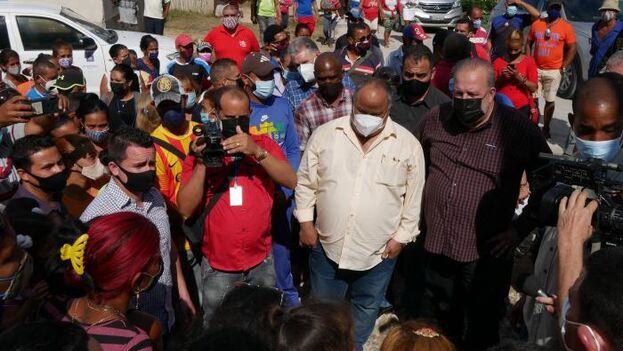
![]() 14ymedio, Havana, 23 March 2023 — Some of the country’s top leaders met this Wednesday to confirm evidence: the indicators of the economy are bad. What’s the reason? The embargo. The forecast? The same, 3% growth. Solutions? “Organize a government in the street.” That was one of the suggestions of the Prime Minister, Manuel Marrero, who summarized his call to “unite all collective intelligence and achieve unity to find solutions.”
14ymedio, Havana, 23 March 2023 — Some of the country’s top leaders met this Wednesday to confirm evidence: the indicators of the economy are bad. What’s the reason? The embargo. The forecast? The same, 3% growth. Solutions? “Organize a government in the street.” That was one of the suggestions of the Prime Minister, Manuel Marrero, who summarized his call to “unite all collective intelligence and achieve unity to find solutions.”
Although Marrero wants to “change things,” if the meeting was characterized by anything it was for the usual mentions, including the stubbornness of Alejandro Gil, Minister of Economy and Planning, who maintained his tourism projections last year until October, when the numbers were clearly irreversible. This year he does not plan to move the growth forecast either, which in December 2022 he calculated at 3%. The calamitous data of 2022 could help him, in this case, to get it right. Or not, just like tourism.
They will bet on the tourism sector again, both leaders said at yesterday’s meeting, although the priority will be to “advance in the macroeconomic stabilization of the country,” a point to which abundant words were dedicated that did not clarify too much.
The plan will include, he said, a “fiscal reform, the recovery of monetary equilibrium, macroeconomic planning and coordination, the development of markets and monetary-commercial relations, the increase in the inflow of foreign exchange, the de-dollarization and convertibility of the national currency and the mitigation of social impacts.” To paraphrase Marrero, these are goals, not solutions.
To this vagueness, Gil added something more concrete: the creation of a new law for companies and fiscal stimuli for those who want to import, but the “socialist enterprise” will be maintained, as always, as the main actor in the production of goods and services. From what was said in yesterday’s meeting, one can sense that the private sector, even when it’s not evident, will continue to support the state.
Among the evils that afflict the country, Gil mentioned the partial dollarization of companies in the non-state sector, inflation, centralized access to the currencies of exporters, the lack of “effective insertion” of the private ones — for which they plan to create an Institute and a General Directorate — and the poor results of the state business sector that, despite the diagnosis, they insist on privileging.
However, Marrero did not attribute those bad results to an inefficient sector or government measures, but, once again, to external agents. “We cannot fail to recognize and denounce that, among all the occurrences that have led to the situation in the country, the blockade* has had a definitive impact,” he complained. And his lament was followed by Gil’s who, in addition to the embargo, cited the pandemic as the cause of the lack of hard currency.
In the midst of the hackneyed speech, there was also no mention of responsibility for inflation. The Minister of Economy said that prices are abusive and have a direct impact on the population, but he didn’t offer a single solution.
While dozens of countries affected by inflationary rates infinitely lower than those of Cuba — where food already costs 73% more than a year ago, without taking into account the prices in the informal market — have been trying different measures to control prices for months, the top managers of the Island are limited to mentioning the problem as if it were a natural force.
One of the possible materializations of the fuzzy words of Marrero and Gil is the “experiment” — as the provincial newspaper Vanguardia refers to the measure — that will be carried out in six state companies in Villa Clara. Foreign currency will be sold at a rate of 1 dollar for 120 pesos to buy supplies and raw materials destined for the manufacture of products that will be marketed in national currency.
It will be a privilege because, although before the rate was officially 1 for 24, the possibility of obtaining foreign currency was almost nil by legal means. At the moment, the concession is for the Porcine Company of Villa Clara ($700,000); the Fisheries of Caibarién and Villa Clara, Pescavilla, ($500,000); the National Production Industry of Domestic Utensils 1st of May ($700,000), and the Textile Company Luis Turcios Lima ($200,000).
With those amounts approved, the entities will have to increase their production of meat, fish, pots or blankets, as the case may be, all of which are scarce in the country. Finally, Minerva Cycles also has an amount assigned or in process, but not yet indicated.
“This is the result of one of the ideas aimed at making 2023 a better year, meeting the needs of the people and combating the scourge of inflation through the production of goods and services, which constitutes the most feasible economic mechanism,” said the governor of the province, Alberto López Díaz.
*Translator’s note: Cuban officialdom routinely refers to the U.S. embargo as “the blockade.”
Translated by Regina Anavy
____________
COLLABORATE WITH OUR WORK: The 14ymedio team is committed to practicing serious journalism that reflects Cuba’s reality in all its depth. Thank you for joining us on this long journey. We invite you to continue supporting us by becoming a member of 14ymedio now. Together we can continue transforming journalism in Cuba.
